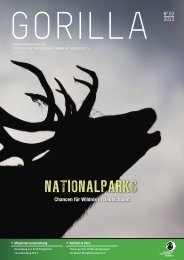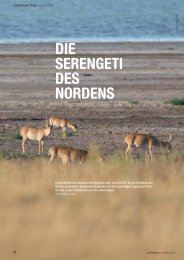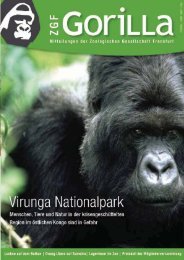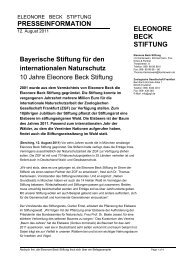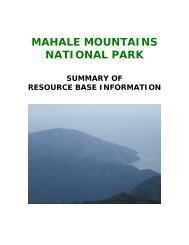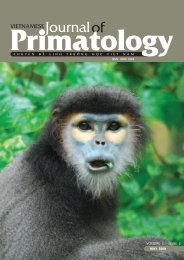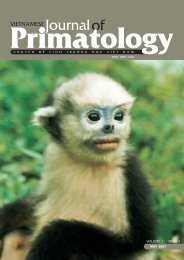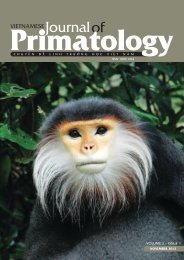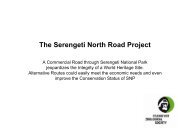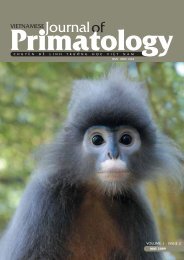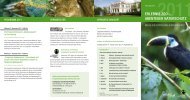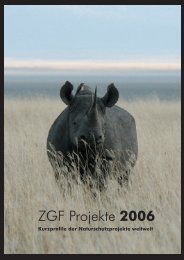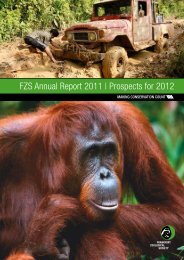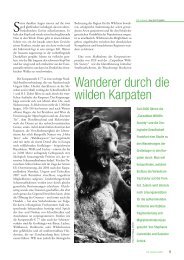Serengeti General Management Plan
Serengeti General Management Plan
Serengeti General Management Plan
- TAGS
- serengeti
- www.zgf.de
Create successful ePaper yourself
Turn your PDF publications into a flip-book with our unique Google optimized e-Paper software.
E. Community Outreach Programme<br />
Warden in charge, who is working on an acting basis. In previous years there was an additional<br />
department member in charge of community education, who took a more strategic role<br />
and provided materials and ideas for the zonal conservation assistants. However, despite<br />
these restrictions, there is much scope for the department to play a strategic role in the coordination<br />
and cooperation of the stakeholders in the ecosystem.<br />
The department already carries out many activities that involve coordinating the outreach<br />
programme with local government, villagers, women’s groups, village game scouts, as well<br />
as NGOs and private stakeholders around the Park. Many of these activities are informal and<br />
at present there is no official forum to coordinate stakeholders involved in community outreach<br />
and CBNRM activities. As the representative of the key player in the ecosystem, the<br />
Outreach Department will take the leading role in the coordination of all these stakeholders,<br />
as outlined in the following management actions:<br />
Action 1.1.1: Enhance the two-way flow of information between park and communities<br />
In order to build trust, respect and support for SENAPA, it is vitally important that regular<br />
communication with stakeholders in local communities occurs both formally and informally.<br />
Indeed, good communication is the basis on which all good relationships are built; simply listening<br />
often goes a long way to mitigating problems. If communication channels are open<br />
and the Park is perceived to be open to complaints, discussion, suggestions and concerns of<br />
the communities; conflict between the Park and communities will be reduced.<br />
This management action will involve the Outreach Department participating in district development<br />
coordination meetings as well as instigating a series of regular meetings; including<br />
an annual stakeholder meeting hosted by SENAPA to discuss community-related issues between<br />
Outreach staff and local communities. SENAPA will also take a lead in coordinating all<br />
the private and NGO stakeholders carrying out outreach activities in the Tanzanian component<br />
of the ecosystem.<br />
To complement these coordination activities, the SENAPA Outreach Department will disseminate<br />
departmental reports and newsletters to local stakeholders as widely as possible<br />
so as to improve surrounding stakeholders’ understanding of Outreach Department objectives<br />
and to provide a more realistic assessment of the resources that are available.<br />
Action 1.1.2: Evaluate the effectiveness of SENAPA outreach activities in collaboration<br />
with community and district representatives<br />
After more than a decade of outreach activities, there is a clear need to assess what impact<br />
these activities are having, for a number of reasons. Firstly, with a limited budget, benefit<br />
sharing is best targeted to communities where it has the most beneficial effect on improving<br />
relations and creating positive conservation outcomes. Secondly, with fears that benefit sharing<br />
may actually attract people to the Park edge, there is an urgent need to confirm or allay<br />
these fears. Knowledge, attitudes and practices surveys were carried out in the 1990’s and<br />
will serve as good baselines for assessing outreach activities. In areas where outreach activities<br />
have not yet reached, baseline surveys will be necessary.<br />
Action 1.1.3: Carry out training on communication and conflict resolution to improve<br />
community liaison skills of rangers and wardens<br />
It is recognised that all rangers and wardens are ambassadors for SENAPA and that all interactions<br />
with local communities (and indeed other stakeholders such as tourists) contribute<br />
to good park-community relations. However, current training of rangers and wardens concen-<br />
83



